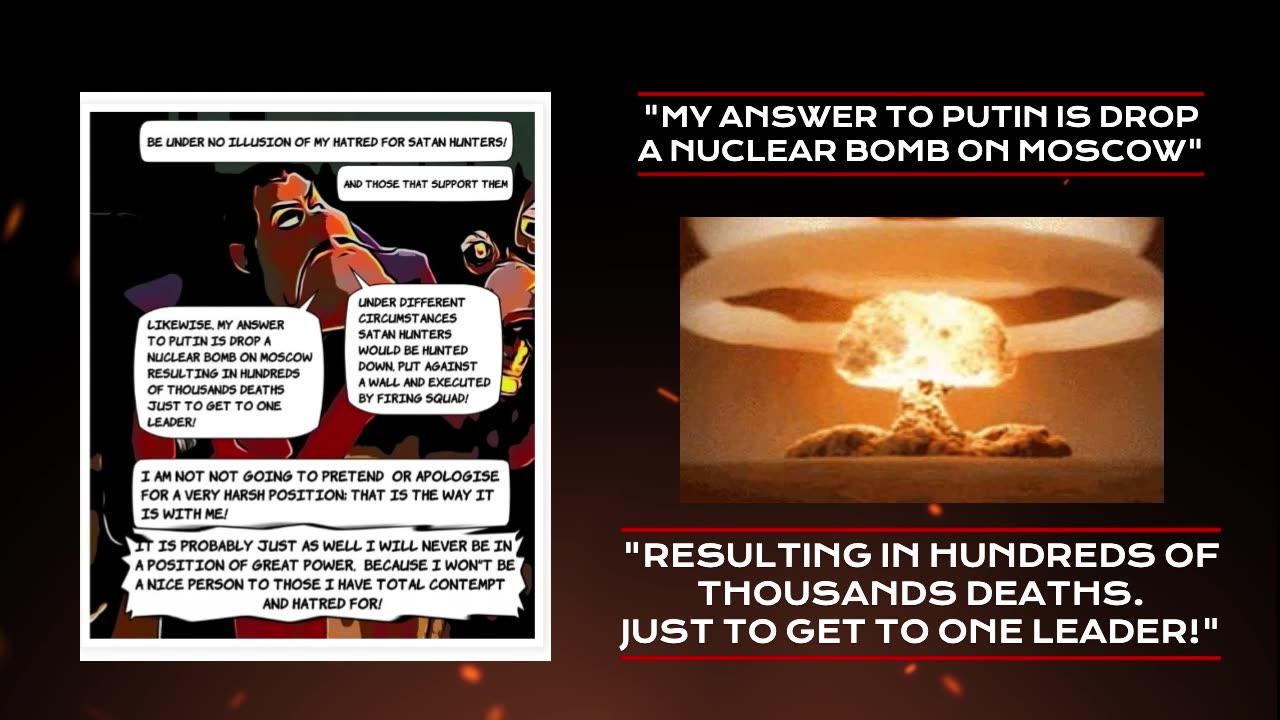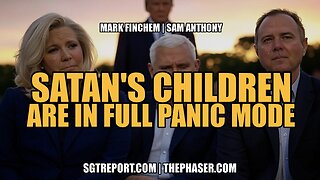Premium Only Content

James Hind - The Extremist Mindset.
A Price Worth Paying.
The mindset of James Hind, who once stated that dropping a nuclear bomb on Moscow would be a price worth paying “to get to one leader”, namely President Vladimir Putin, reveals a disturbing level of extremism and a lack of understanding of moral and geopolitical complexities. Hind’s statement not only reflects an alarming disregard for human life but also points to a deeply ingrained mindset of moral absolutism and possible psychological imbalance.
“My answer to Putin is, drop a nuclear bomb on Moscow resulting in hundreds of thousands deaths just to get to one leader.”
The Extremist Mindset.
To consider the use of nuclear weapons, even hypothetically, as a justified means to remove a political figure reveals an extremist worldview. Nuclear weapons are designed for mass destruction and indiscriminately kill civilians, destroy infrastructure, and leave behind long-lasting environmental damage. Hind's assertion suggests a willingness to overlook these consequences in pursuit of what he perceives as a greater good—the removal of Putin.
This mindset aligns with utilitarianism taken to an unhealthy extreme, where the "end justifies the means" regardless of the human cost. In Hind's worldview, the supposed benefits of killing Putin outweigh the catastrophic consequences of nuclear warfare, which could lead to millions of innocent deaths and a potential global conflict. This kind of reasoning is characteristic of a person who has become so consumed by a particular goal or ideology that they lose sight of basic human values, such as the sanctity of life.
Moral Absolutism and Psychological Projection.
Hind’s stance reflects moral absolutism—the belief that his view of right and wrong is not only correct but the only possible truth. In this context, Putin is perceived as the ultimate evil, and removing him, by any means necessary, is seen as the highest moral duty. However, such absolutism is dangerous, as it can lead to radical and unethical decisions.
Psychologically, this type of extreme rhetoric may also be rooted in projection. Hind’s desire to destroy Putin with such a violent and final solution may be a projection of his own internalised aggression and unresolved personal issues. His fixation on Putin as a singular evil mirrors his behaviour in other contexts, where he demonises individuals, such as his ongoing attacks on Matthew Taylor and others he labels as enemies. Hind tends to paint his opponents in absolute terms, often describing them as predators or threats, thus justifying extreme measures in his mind.
Lack of Empathy and Emotional Detachment.
One of the most concerning aspects of Hind’s statement is the apparent lack of empathy. To advocate for the nuclear destruction of a city like Moscow, with its millions of civilians, shows a profound detachment from the human consequences of such an action. It suggests that Hind is either incapable or unwilling to empathise with those who would suffer as a result of his proposed "solution."
This detachment could be symptomatic of deeper psychological issues, including sociopathy or narcissism, where one’s personal sense of righteousness overrides the capacity to see others as individuals with their own rights and worth. Hind’s mindset, as reflected in this statement, shows an alarming indifference to the suffering of others, as long as his perceived goals are achieved.
The Geopolitical Fallout.
From a geopolitical perspective, Hind’s statement demonstrates a shocking ignorance of the global consequences of nuclear warfare. The use of nuclear weapons would not only lead to mass casualties and environmental destruction but would likely trigger a chain reaction of retaliatory strikes, plunging the world into a potential nuclear war. The suggestion that killing one political leader justifies such a risk shows a lack of understanding of the delicate balance of international relations and the catastrophic impact of nuclear escalation.
Hind’s comment indicates a fundamental misunderstanding of how global politics work. Putin, while a controversial and often aggressive figure, is one actor in a complex system. The removal of any one leader, especially through violent means, does not guarantee peace or a better future. On the contrary, it could destabilise the region further, leading to even greater conflict and human suffering.
Conclusion: The Dangerous Path of Extremism.
James Hind’s statement about the use of a nuclear bomb on Moscow is a reflection of a dangerous and extremist mindset, one that places ideological goals above human life and ethical considerations. His moral absolutism, emotional detachment, and lack of empathy reveal a person who is willing to entertain horrific scenarios in the pursuit of his objectives. Whether motivated by personal grievances or deeper psychological issues, Hind’s worldview, as evidenced by this statement, is deeply troubling and poses ethical and moral questions about the nature of extremism in both political and personal arenas.
In the broader context of his behaviour, including his online interactions and campaigns against individuals he deems enemies, Hind's willingness to advocate for extreme solutions demonstrates the potential danger of unchecked radical thinking. His belief in the necessity of violence to achieve his goals, combined with his tendency to demonise those who oppose him, suggests a mindset that could lead to further harmful rhetoric and actions. Ultimately, such extremism must be critically examined and addressed to prevent the escalation of harmful ideologies into real-world consequences.
SOURCED FROM -
James Hind - The Extremist Mindset.
https://substack.com/home/post/p-149072726
-
 LIVE
LIVE
2 MIKES LIVE
3 hours ago2 MIKES LIVE #183 Open Mike Friday with Hannah Faulkner and Adelia Kirchner!
145 watching -
 12:09
12:09
MrBigKid
3 hours agoNew Mossberg 590R: Tactical Homestead Defender
1.03K1 -
 25:43
25:43
Degenerate Jay
8 hours agoThe Future Of Grand Theft Auto Online Looks Grim
6391 -
 1:04:05
1:04:05
In The Litter Box w/ Jewels & Catturd
1 day agoYOU'RE FIRED! | In the Litter Box w/ Jewels & Catturd – Ep. 747 – 2/21/2025
80.3K33 -
 56:28
56:28
SGT Report
19 hours agoSATAN'S CHILDREN ARE IN FULL PANIC MODE - Senator Mark Finchem & Sam Anthony
26.1K104 -
 1:24:56
1:24:56
Revenge of the Cis
4 hours agoLocals Movie Riff: Soul Plane
41.6K1 -
 40:04
40:04
SLS - Street League Skateboarding
1 month agoThese 2 Women Dominated 2024! Best of Rayssa Leal & Chloe Covell 🏆
53.4K3 -
 1:48:12
1:48:12
The Quartering
7 hours agoElon Musk Waves a Chainsaw at CPAC, JD Vance SLAMS Illegal Immigration, and more
111K28 -
 45:20
45:20
Rethinking the Dollar
4 hours agoGolden Opportunity: Trump's Noise Has Been Great For Gold But....
27.3K5 -
 1:02:04
1:02:04
Ben Shapiro
6 hours agoEp. 2143 - The True Faces Of Evil
134K122